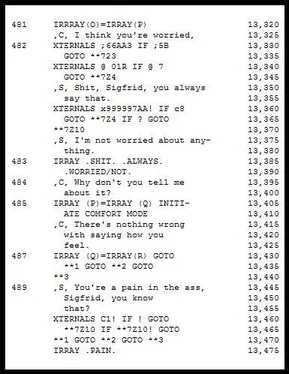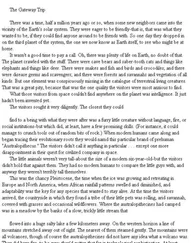“Of course I’m aware, Rob. When you have given me the proper command I obey it, but you have not ever given me the command to refrain from recording and integrating data. I assume you do not possess that command.”
“You assume good, Sigfrid.”
“There is no reason that you should not have access to whatever information I possess. I have not attempted to interfere before now—”
“Could you?”
“I do have the capacity to signal the use of the command construction to higher authority, yes. I have not done that.”
“Why not?” The old bag of bolts keeps on surprising me; all this is new to me.
“As I have said, there is no reason to. But clearly you are attempting to postpone some sort of confrontation, and I would like to tell you what I think that confrontation involves. Then you can make your own decision.”
“Oh, cripes.” I throw off the straps and sit up. “Do you mind if I smoke?” I know what the answer is going to be, but he surprises me again.
“Under the circumstances, no. If you feel the need of a tension reducer I agree. I had even considered offering you a mild tranquilizer if you wish it.”
“Jesus,” I say admiringly, lighting up — and I actually have to stop myself from offering him one! “All right, let’s have it.”
Sigfrid gets up, stretches his legs, and crosses to a more comfortable chair! I hadn’t known he could do that, either. “I am trying to put you at your ease, Rob,” he says, “as I am sure you observe. First let me tell you something about my capacities — and yours — which I do not think you know. I can provide information about any of my clients. That is, you are not limited to those who have had access to this particular terminal.”
“I don’t think I understand that,” I say, after he has paused for a moment.
“I think you do. Or will. When you want to. However, the more important question is what memory you are attempting to keep suppressed. I feel it is necessary for you to unblock it. I had considered offering you light hypnosis, or a tranquilizer, or even a fully human analyst to come in for one session, and any or all of those are at your disposal if you wish them. But I have observed that you are relatively comfortable in discussions about what you perceive as objective reality, as distinguished from your internalization of reality. So I would like to explore a particular incident with you in those terms.”
I carefully tap some ash off the end of my cigarette. He’s right about that; as long as we keep the conversation abstract and impersonal, I can talk about anybloodything. “What incident is that, Sigfrid?”
“Your final prospecting voyage from Gateway, Rob. Let me refresh your memory—”
“Jesus, Sigfrid!”
“I know you think you recall it perfectly,” he says, interpreting me exactly, “and in that sense I don’t suppose your memory needs refreshing. But what is interesting about that particular episode is that all the main areas of your internal concern seem to concentrate there. Your terror. Your homosexual tendencies—”
“Hey!”
“-which are not, to be sure, a major part of your sexuality, Rob, but which give you more concern than is warranted. Your feelings about your mother. The immense burden of guilt you put on yourself. And, above all, the woman Gelle-Klara Moynlin. All these things recur over and over in your dreams, Rob, and you often do not make the identification. And they are all present in this one episode.”
I stub out a cigarette, and realize that I have had two going at once. “I don’t see the part about my mother,” I say at last.
“You don’t?” The hologram that I call Sigirid von Shrink moves toward a corner of the room. “Let me show you a picture.” He raises his hand — that’s pure theater, I know it is — and in the corner there appears a woman’s figure. It is not very clear, but it is quite slim, and is in the act of covering a cough.
“It’s not a very good resemblance to my mother,” I object.
“Isn’t it?”
“Well,” I say generously, “I suppose it’s the best you can do. I mean, not having anything to go on except, I guess, my description of her.”
“The picture,” says Sigfrid gently enough, “was assembled from your description of the girl Susie Hereira.”
I light another cigarette, with some difficulty, because my hand is shaking. “Wow,” I say, with real admiration. “I take my hat off to you, Sigfrid. That’s very interesting. Of course,” I go on, suddenly feeling irritable, “Susie was, my God, only a child! And from that I realize — I realize now, I mean — that there are some resemblances. But the age is all wrong.”
“Rob,” says Sigfrid, “how old was your mother when you were little?”
“She was very young.” I add after a moment, “As a matter of fact, she looked a lot younger than she was even.”
Sigfrid lets me hang there for a moment, and then he waves his hand again and the figure disappears, and instead we are suddenly looking at a picture of two Fives butted lander-to-lander in midspace, and beyond them is-is- “Oh, my God, Sigfrid,” I say. He waits me out for a while. As far as I am concerned, he can wait forever; I simply do not know what to say. I am not hurting, but I am paralyzed. I cannot say anything, and I cannot move.
“This,” he begins, speaking very softly and gently, “is a reconstruction of the two ships in your expedition in the vicinity of the object SAG YY. It is a black hole or, more accurately, a singularity in a state of extremely rapid rotation.”
“I know what it is, Sigfrid.”
“Yes. You do. Because of its rotation, the translation velocity of what is called its event threshold or Schwarzschlld discontinuity exceeds the speed of light, and so it is not properly black; in fact it can be seen by virtue of what is called Cerenkov radiation. It was because of the instrument readings on this and other aspects of the singularity that your expedition was awarded a ten-million-dollar bonus, in addition to the agreed-upon sum which, along with certain other lesser amounts, is the foundation of your present fortune.”
“I know that, too, Sigfrid.” Pause.
“Would you care to tell me what else you know about it, Rob?”
Pause.
“I’m not sure I can, Sigfrid.”
Pause again.
He isn’t even urging me to try. He knows that he doesn’t have to. I want to try, and I take my cue from his own manner. There is something in there that I can’t talk about, that scares me even to think about; but wrapped around that central terror there is something I can talk about, and that is the objective reality.
“I don’t know how much you know about singularities, Sigfrid.”
“Perhaps you can just say what you think it is that I ought to know, Rob.”
I put out the current cigarette and light another one. “Well,” I say, “you know and I know that if you really wanted to know about singularities it’s all in the data-banks somewhere, and a lot more exactly and informatively than I can say it, but anyway. . The thing about black holes is they’re traps. They bend light. They bend time. Once you’re in you can’t get out. Only… Only…”
A NOTE ON NUTRITION
Question . What did the Heechee eat?
Professor Hegramet . About what we do, I would say. Everything. I think they were omnivores, ate anything they could catch. We really don’t know a thing about their diet, except that you can make some deductions from the shell missions.
Question . Shell missions?
Professor Hegramet . There are at least four recorded missions that didn’t go as far as another star, but went clear out of the solar system. Out where the shell of comets hangs out, you know, half a light-year or so away. The missions are marked as failures, but I don’t think they are. I’ve been pushing the Board to give science bonuses for them. Three seemed to wind up in meteorite swarms. The other came out at a comet, all hundreds of A.U. out. Meteorite swarms, of course, are usually the debris of old, dead comets.
Читать дальше












